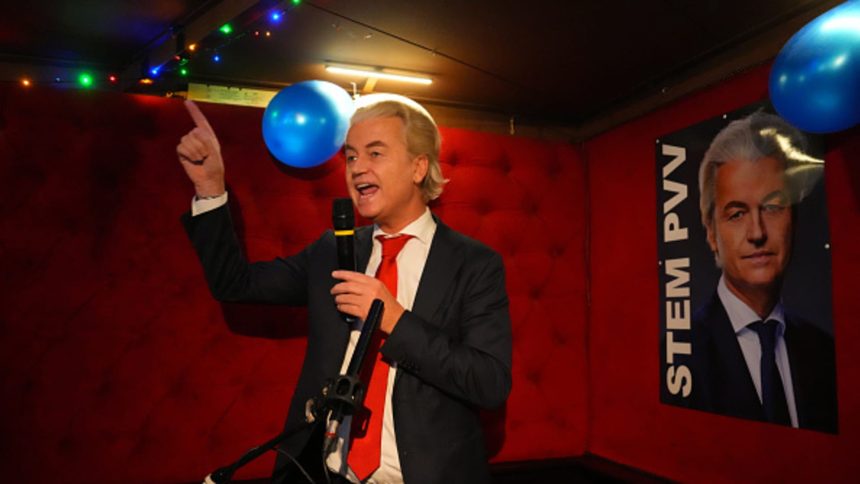Far-right politician Geert Wilders sent shockwaves through the European political landscape as he led his party to a decisive victory in the Netherlands’ general elections.
Only late in the campaign did polls begin to suggest that controversial Wilders, who rails against immigration and espouses a series of Islamophobic policies, could come to power after 25 years in politics.
The result of Wednesday’s election will be concerning both to Brussels — Wilders’ Euroskepticism extends as far as calling for a ‘Nexit’, or Netherlands exit from the European Union — and to Ukraine, as Wilders has pledged to cut off military aid.
The Netherlands is the EU’s fifth-biggest economy and has proved influential, with a significant sway in policymaking. For 13 years the country has been led by centre-right Mark Rutte, who developed a reputation as the “teflon prime minister” for his ability to weather scandals while being a pragmatic dealmaker.
The Netherlands is also a key U.S. ally in the ever-important spheres of trade and technology, where it has rolled out export restrictions on advanced semiconductor equipment amid U.S. efforts to curb supplies to China. Its role here is vital due to its homegrown firm ASML, one of the most important semiconductor companies in the world.
Next steps
Forming a coalition in the 150-seat Dutch parliament is typically lengthy and difficult, even where the victor is not a political pariah.
There is still no guarantee Wilders will become the new prime minister, even with his Freedom Party (PVV)’s 37 seats. Much hinges on whether other parties will go back on previous pledges not to work with the PVV, particularly in light of the size of its victory.
Sarah de Lange, professor in the Department of Political Science at the University of Amsterdam, said the most likely outcome appears to be a right-wing government comprised of the PVV, Rutte’s conservative VVD Party, and Pieter Omtzigt’s New Social Contract party, which was formed in August with a pledge to “do politics differently.”
This would likely require Wilders to give up the most extreme components of his manifesto, which include proposals to bring immigration to zero, ban the Quran and close mosques, many of which are unconstitutional, de Lange told CNBC’s “Squawk Box Europe.”
On fiscal policy, Wilders’ party has a “clear populist” bent, said Ester Barendregt, chief economist at Rabobank.
“So, a lot of wishes for more public spending, for instance, pensions, higher minimum wages and lots of other things, but much less clear ideas on how to pay for it. Certainly one wish of Geert Wilders is to pay less to Europe. Of course, it remains to be seen how much room for maneuver he will have.”
However, forming a government may involve a coalition with parties that are “keen on keeping government financing under control,” Barendregt added, which would mean spending was balanced by cuts.
“I would expect markets to understand the political landscape in the Netherlands, which means coalition forming and compromises on all sides… And in fact, Geert Wilders has been able to win these elections, I think, also because of his more moderate tone in recent weeks, which has drawn more voters than was previously expected,” she said.
The PVV did not follow the convention of submitting its economic plan to a planning board for an analysis of its viability, noted Liza Mügge, an associate professor at the University of Amsterdam — adding to uncertainty.
EU nerves?
The decisive issues in Wilders’ victory were likely immigration and the Dutch housing crisis, Mügge said by phone, with the European Union and foreign policy discussed much less frequently.
Overall, analysts said, a Wilders-led government is likely to be more antagonistic within the EU, but the extent of this may be reined in by coalition partners.
This may not ease nerves in Brussels over the future of unity in the bloc and agreement on topics such as Ukraine aid, migration and refugees.
Wilders would join fellow EU leaders who are heavily critical of its policies — such as in Slovakia and Hungary — and those who are pushing their countries’ politics further to the right, like in Sweden and Italy.
The EU will now be watching the Netherlands’ government formation closely, Alexandra Kellert, associate director at consultancy Control Risks, said by email.
To court allies, Wilders may need to rule out any “Nexit” vote, she said.
There is little indication that such a vote would gather much momentum in any case, with polling from this year suggesting that around 67% of people have a favorable view of the EU.
“In the unlikely event that Wilders does become prime minister, the biggest impact would be in the European Council. This is where there is the potential for Wilders to team up with other Eurosceptic leaders like [Hungary’s] Viktor Orban to disrupt policy-making, especially on foreign policy issues like sanctions, which require unanimity, and support for Ukraine,” Kellert said.
“The EU will also be thinking about what the results mean for the upcoming European Parliament elections next June. A repeat of the PVV’s success and of other populist parties across the EU would make it harder for the EU to pass legislation in some areas, particularly related to climate change.”
Read the full article here




